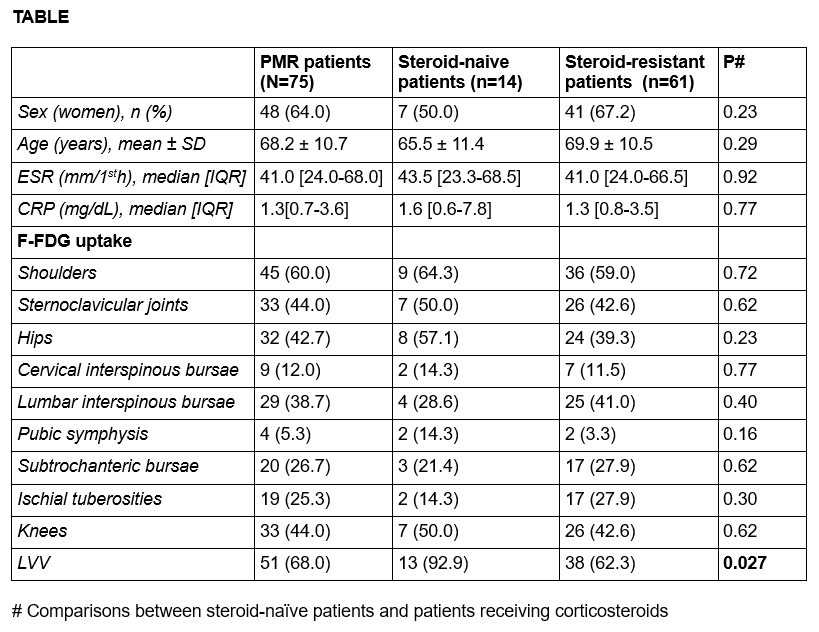Session Information
Session Type: Poster Session (Monday)
Session Time: 9:00AM-11:00AM
Background/Purpose: Fluorine-18-fluorodeoxyglucose (18F-FDG) PET/CT has been proposed as a promising tool for assessing both musculoskeletal and vascular involvement in patients with polymyalgia rheumatica (PMR). Glucocorticoids (GC) may decrease the intensity of 18F-FDG uptake. Therefore, performance of PET/CT before steroid therapy is recommended. However, in many patients with PMR, large vessel vasculitis (LVV) is precisely suspected because of steroid resistance after a long-term treatment with GC. Our aim was to assess the influence of long-term medium-dose treatment on 18F-FDG vascular and musculoskeletal uptake to discern if 18F FDG PET/CT could be useful to evaluate patients with polymyalgia rheumatica under treatment with GC.
Methods: Single-center study of 75 patients with PMR diagnosis based on 2012 EULAR/ACR criteria. All patients underwent a PET/CT scan due to LVV suspicion based on the presence of atypical symptoms and/or persistent symptoms despite steroid therapy. We considered two groups: a) Steroid-naïve PMR patients. b) Steroid-resistant PMR patients. Both musculoskeletal and vascular 18F-FDG uptake was assessed. The statistical analysis was performed with SPSS. Distributions of categorical variables were compared by Pearson Chi2 or Fisher exact test as appropriate.
Results: We evaluated 75 patients, 27 men and 48 women (mean age ± SD: 68.2 ± 10.7 years). PET/CT was performed in 14 steroid-naïve PMR patients (18.7%) and 61 steroid-resistant PMR patients (81.3%). Patients under steroid treatment had received a median dose of Prednisone of 10.0 [5.0-15.0] mg/day during 9.0 [2.0-22.0] months. Vascular 18F-FDG uptake was more frequently detected in steroid-naïve patients. In regard with musculoskeletal 18F-FDG uptake, no statistically significant differences were seen between both groups (TABLE).
Conclusion: Vascular 18F-FDG uptake detection was higher in PMR patients with LVV suspicion who had never received GC. However, PET/CT was also useful to detect vascular involvement in most of the patients under a long-term medium-dose steroid treatment.
To cite this abstract in AMA style:
PRIETO- PENA D, Calderón-Goercke M, Martínez Rodríguez I, Banzo I, Sanchez-Bilbao L, Gonzalez-Mazon I, Atienza-Mateo B, González-Gay M, Blanco R. Influence of Steroid Treatment on 18F-FDG PET/CT Accuracy to Detect Vascular and Musculoeskeletal Involvement in Patients with Polymyalgia Reumatica [abstract]. Arthritis Rheumatol. 2019; 71 (suppl 10). https://acrabstracts.org/abstract/influence-of-steroid-treatment-on-18f-fdg-pet-ct-accuracy-to-detect-vascular-and-musculoeskeletal-involvement-in-patients-with-polymyalgia-reumatica/. Accessed .« Back to 2019 ACR/ARP Annual Meeting
ACR Meeting Abstracts - https://acrabstracts.org/abstract/influence-of-steroid-treatment-on-18f-fdg-pet-ct-accuracy-to-detect-vascular-and-musculoeskeletal-involvement-in-patients-with-polymyalgia-reumatica/

